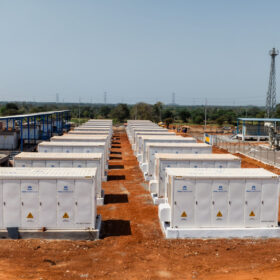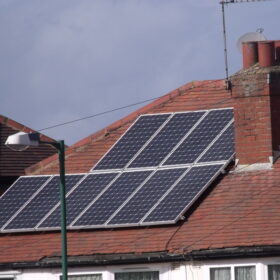Fitch Ratings has assigned India Cleantech Energy’s (ICEL) proposed US dollar senior secured notes due 2026 an expected rating of ‘BB-(EXP)’. The Outlook is Stable.
The rating on the notes reflects the credit profile of a restricted group of 12 entities (Acme RG1) that are fully owned by Acme Solar Holdings Private Limited. Acme RG1 operates solar generation assets with combined capacity of 450MW (or 605MWp) in eight Indian states. ICEL is an orphan financing vehicle incorporated in Mauritius that will be held by a trust and its ownership is not linked to Acme Solar Holdings.
ICEL will use the proceeds of the proposed notes to subscribe to non-convertible debentures (NCDs) denominated in rupees to be issued by the entities in the restricted group. ICEL will not undertake any business activity other than investing in the NCDs. The operating entities in Acme RG1 will use the proceeds of NCDs to repay existing project debt and address prepayment penalties and transaction costs. Any remaining proceeds will be upstreamed to Acme Solar Holdings.
Rating rationale
The rating benefits from the fully contracted revenues of the operating assets, whose counterparties include sovereign-owned entities and distribution companies owned by various Indian states. The rating is also supported by the adequate financial profile of the restricted group. All of Acme RG1’s capacity is under long-term power purchase agreements (PPAs) with the majority (93% of capacity) with tariffs fixed through the PPA terms, which extend beyond the tenor of the proposed US dollar notes.
We consider the revenue from sovereign-owned utilities as fully contracted revenue and apply the fully contracted project threshold. The credit quality of sovereign-owned utilities does not constrain the rating as we treat the revenue exposure to these utilities as the systemic risk of the sector. While Fitch does not rate the state-owned utilities, we believe that delay in payments by one of them would not necessarily lead to a default of the transaction given diversification across multiple counterparties. However, we consider it prudent to treat the revenue from these state utilities as merchant revenue and apply the merchant project threshold. Therefore, we apply a revenue-based weighted average threshold in determining the rating.
Key rating drivers
Experienced contractors. Acme RG1 comprises polycrystalline solar projects, which are a proven technology with a long-established history. We regard the operation of this type of solar projects as straightforward and the solar modules are provided by internationally known suppliers. Operation and maintenance work is carried out by Acme Cleantech Solutions Private Limited and its affiliate under 25-year fixed-price contracts with 4% annual price escalation. Replacement operators are readily available in the market. The operation risk assessment is constrained to ‘Midrange’ as the operating cost forecast is not validated by an independent technical advisor and the operating record shows modest variability.
Reasonable forecast spread, adequate operating performance. The energy yield forecast produced by third-party experts indicates an overall P50/1-Year P90 spread of 7% leading to the ‘Midrange’ assessment for revenue risk (volume). The portfolio has capacity-weighted average life of about 4.0 years with all assets operating for more than 2 years. The actual load factors recorded by Acme RG1’s portfolio in the financial years ended in March 2020 (FY20) and March 2021 (FY21), which amount to full years of operation for all the assets, exhibit low volatility from the 1-year P90 projections (about 2%). The curtailment risk is limited in India given the “must-run” status of renewable energy projects.
Fixed long-term prices for almost all contracts. All of Acme RG1’s capacity is under long-term PPAs, with 93% of capacity under fixed-price contracts that extend beyond the tenor of the proposed US dollar notes, protecting the portfolio from merchant price volatility. The revenue risk (price) is constrained to ‘Midrange’ because 7% of Acme RG1’s capacity is exposed to the national average power purchase cost (APPC), which is set annually. However, the variable tariff will apply only in FY28, which is after the maturity of the proposed US dollar notes. The PPAs of Acme RG1’s portfolio have capacity-weighted residual life of about 21 years. Contracts with sovereign-owned utilities account for 55% of alternative current (AC) capacity (or about 61% of direct current (DC) capacity) of the restricted group’s total capacity while the remaining capacity is contracted with state distribution companies.
Partially amortised bond, manageable refinancing risk. About 7% of the principal of the proposed US dollar notes will be amortised over the note life. The refinancing risk exposure is mitigated by a mandatory cash sweep of about 19% of principal and a cash trap in the final year. The refinancing risk of the remaining 68% of principal is further mitigated by the remaining tenor of PPAs, which extend beyond maturity of the notes, and the group’s access to domestic markets.
The NCDs will be cross guaranteed by each of Acme RG1’s entities. The NCDs benefit from the usual protective structural features, including a standard cash distribution waterfall, distribution lockup at 1.3x 12-month backward-looking debt service coverage ratio (DSCR) and cash lock-up in the final year of the bond tenor. The restricted group will maintain a debt service reserve account but not a major maintenance reserve account.
The US dollar noteholders benefit from a 100% share pledge by ICEL and charge over all assets of ICEL excluding its rupee-denominated NCDs. ICEL, which is the holder of the rupee NCDs issued by operating entities within the restricted group, benefits from a standard security package, including charge over movable and immovable assets, and a pledge over a 51% stake in the restricted group entities. While this provides the noteholders with only indirect access to the NCDs’ security package, this is a common issuance structure adopted by several other Fitch-rated transactions.
The transaction is partially exposed to rupee depreciation up to a contracted strike price in relation to the 40% remaining principal hedged using options. However, holders of the NCDs will provide a redemption premium to cover any funding shortfall between the forex spot at inception and strike price, which will mitigate the risk to bond holders, although it weakens the credit profile of Acme RG1.





